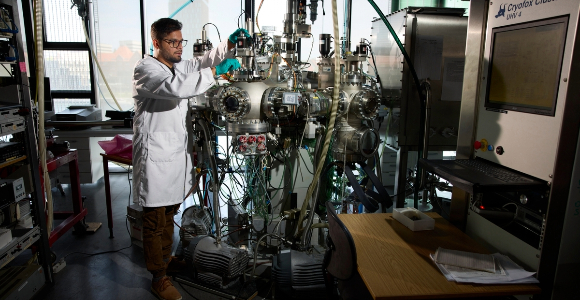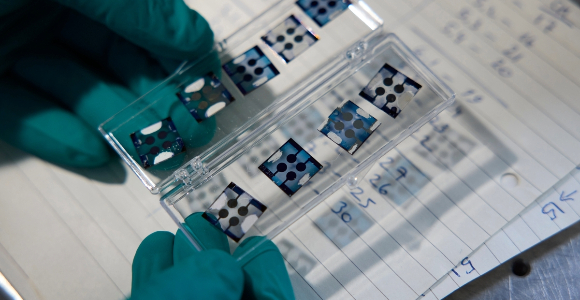
Solar panels used indoors can replace batteries in small devices
SDU's new translational postdoc Bhushan Patil wants to replace batteries in small devices such as clocks and keyboards with solar panels that collects energy from indoor light in homes and offices.
As a new postdoc in the Spin-outs Denmark programme, Bhushan Patil has been given one year to create a company based on his research. He aims to replace batteries in several low-power consuming products by using solar panels indoors in offices and homes.
These solar panels are very different from the silicon-based solar panels we normally see in the fields or on roofs, as they are made in thin films of organic materials and are more flexible. The solar panels can also be made semi-transparent so you can see through them, and they catch light from both the sun and artificial light indoors.
- The same outdoor organic solar panels that convert 10–15% of sunlight into electricity can also convert up to 30% of indoor artificial light into electricity. So, they are the perfect choice for working efficiently under indoor light conditions, the researcher says.
- They can generate power from very low light, such as the light from computer screens, lightbulbs, lamps, or any indoor light source, says Patil, who has been working in this field for more than 10 years.

The materials used to produce these solar panels are not toxic to the environment and are processed from eco-friendly solvents.
Conventional batteries are made of several toxic materials, and they need to be replaced – even if you buy rechargeable batteries – and when they are thrown away, they require special recycling.
Replacing batteries with solar cells
- It is much more environmentally friendly to work with organic solar panels than to use batteries. If used as indoor light panels, they can last for up to 10 years or more, so the hassle of replacing batteries can be eliminated in an eco-friendly way, the researcher estimates.
- A 5x5 cm solar panel unit as thin as notebook paper can generate up to three to five volts, which is equivalent to two or three AA or AAA batteries, he explains.
However, not all batteries can be replaced by organic solar panels. For example, the batteries in a phone consume too much power than these panels can generate.
In such cases, the solar panels can be implemented to aid the battery, thus prolonging battery usage time.
”If used as indoor light panels, they can last for up to 10 years or more, so the hassle of replacing batteries can be eliminated in an eco-friendly way
The Spin-outs Denmark programme is open to all junior researchers who wish to start a business based on research in the humanities or the technical, natural, or social sciences.
As part of the programme, Bhushan Patil receives one year of financial and professional assistance to develop a concrete idea and found his own business.
- When I heard about this programme, I was very interested because I have always wanted to work with product development and go in a commercial direction, he explains.
Bhushan Patil is the third researcher at SDU to be appointed as a translational postdoc. The first two are Kristian Husum Laursen, who is developing a drone for the construction sector, and Ïo Valls-Ratés, who is strengthening young people's public speaking abilities using virtual reality.

In one year from now, Bhushan Patil will have developed solar panels that can be used in keyboards, temperature sensors, clocks, and other devices.
Gained experience with a company
For a short period, he worked for a Swedish company in the same field. This was when he realised that the solar panels must be adapted to the customers' wishes.
- I work with different sizes, shapes, colours and designs so that the solar panels can be attractive and are not ignored by consumers just because they look ugly. In fact, it is also possible to integrate them into shape of a logo. In this way, they will not be as visible and will serve the purpose while being hidden in the logo, he explains.
Bhushan Patil comes from Swansea University and now works with Professor Morten Madsen and the research group at the Mads Clausen Institute in Sønderborg, where he was previously a PhD student.
Building drones and public speaking
- Read more about translational postdoc Kristian Husum Laursen who has established the company CODRONE.
- Read about translational postdoc Ïo Valls-Ratés who has established the company VirtuVoce.
Programme for junior researchers
Spin-outs Denmark is a one-year programme for junior researchers who wants to create a company based on their own research. The programme is run by the eight Danish universities and is funded by the Villum Foundation. Spin-outs Denmark expects to appoint up to 60 translational postdocs over five years.